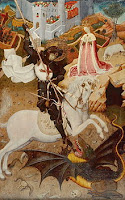St George, protector of human life
“You have protected me from the assembly of the malignant” (Ps 64.3)
As well as being the patron of England, St George is the patron of Egypt, Bulgaria, Aragon, Catalonia, Romania, Ethiopia, Greece, India, Iraq, Lithuania, Palestine, Portugal, Serbia, Ukraine and Russia. And of course, Georgia where there are 365 Churches dedicated to him.
Thanks to the rise of irrational rationalism, even many Catholics go along with the idea that because there was a legend about St George, he must himself have been a legend. The dedication of Churches to him from the fourth century onwards rather tells against this fancy.
We may provisionally accept the general consensus that he was born sometime between 256 and 283, that he was a soldier in the Imperial Guard at Nicomedia under Diocletian, that when the most savage of persecutions began, including the requirement that every soldier sacrifice to the false gods, St George openly professed his faith and was martyred. When I offer incense on the feast of a martyr I often reflect that all they had to do to save their lives was to offer a few grains of incense to the false gods.
The first Church in his honour in England dates back to the reign of Alfred, but his popularity grew during the crusades. His was very much a popular cultus rather than centrally organised, and by the time of the hundred years’ war, he was invoked continually by the soldier, immortalised of course in the line of Henry V “Cry ‘God for Harry, England and St George!’”
The legend of the defeat of the dragon has its own significance for England today. The people of Silene had to bring a sheep in order to appease the dragon so that they could draw water. When a sheep was not available, a maiden was substituted, the name being drawn by lot. St George happened along when the princess was to be sacrificed. He fortified himself with the sign of the cross and slayed the dragon.
Today in England, human sacrifice takes the particular form of abortion and the killing of human embryos either for experimentation or in the process of IVF. This sacrifice is made in order to avoid some difficulty, to create new life according to our own demands, or to use the human life to produce a cure for other, older people.
We pray to St George for the protection of human life in England today, for the true, worthy and noble respect of maidenhood, and for the triumph of the truth against falsehood, good against evil, God against Satan.
Cry “God for Elizabeth, England and St George.”
As well as being the patron of England, St George is the patron of Egypt, Bulgaria, Aragon, Catalonia, Romania, Ethiopia, Greece, India, Iraq, Lithuania, Palestine, Portugal, Serbia, Ukraine and Russia. And of course, Georgia where there are 365 Churches dedicated to him.
Thanks to the rise of irrational rationalism, even many Catholics go along with the idea that because there was a legend about St George, he must himself have been a legend. The dedication of Churches to him from the fourth century onwards rather tells against this fancy.
We may provisionally accept the general consensus that he was born sometime between 256 and 283, that he was a soldier in the Imperial Guard at Nicomedia under Diocletian, that when the most savage of persecutions began, including the requirement that every soldier sacrifice to the false gods, St George openly professed his faith and was martyred. When I offer incense on the feast of a martyr I often reflect that all they had to do to save their lives was to offer a few grains of incense to the false gods.
The first Church in his honour in England dates back to the reign of Alfred, but his popularity grew during the crusades. His was very much a popular cultus rather than centrally organised, and by the time of the hundred years’ war, he was invoked continually by the soldier, immortalised of course in the line of Henry V “Cry ‘God for Harry, England and St George!’”
The legend of the defeat of the dragon has its own significance for England today. The people of Silene had to bring a sheep in order to appease the dragon so that they could draw water. When a sheep was not available, a maiden was substituted, the name being drawn by lot. St George happened along when the princess was to be sacrificed. He fortified himself with the sign of the cross and slayed the dragon.
Today in England, human sacrifice takes the particular form of abortion and the killing of human embryos either for experimentation or in the process of IVF. This sacrifice is made in order to avoid some difficulty, to create new life according to our own demands, or to use the human life to produce a cure for other, older people.
We pray to St George for the protection of human life in England today, for the true, worthy and noble respect of maidenhood, and for the triumph of the truth against falsehood, good against evil, God against Satan.
Cry “God for Elizabeth, England and St George.”

